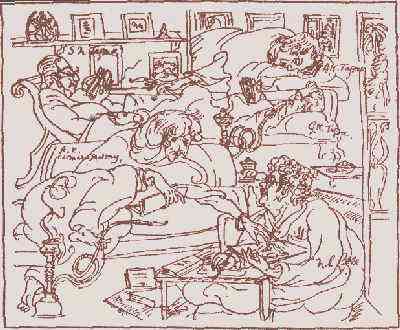
Presented by Cultural Survival annually since 1989, the Ananda Coomaraswamy Oration series,has featured keynote addresses by prominent figures including former President J.R. Jayawardene, on topical issues pertaining to the interplay of modernity and tradition.
Year |
Orator |
Capacity |
|
1989
|
Ranjit
Fernando |
Institute
of Traditional Studies |
|
1989 |
H.E
David Gladstone |
British
High Commissioner |
|
1989 |
H.E.
Lakhan Lal Mehrotra |
Indian
High Commissioner |
|
1990 |
H.E.
Nagendra Nath Jha |
Indian
High Commissioner |
|
1990 |
Bradman
Weerakoon |
Presidential
Advisor on International Affairs |
|
1991 |
H.E.
President JR Jayawardena |
First
Executive President Of Sri Lanka |
|
1992 |
Hon.
Tyronne Fernando |
Minister
For Legal & Prisons Reform |
|
1993 |
Hon. Gamini Dissanayake |
Leader,
Democratic United National Front |
|
1994 |
H.E.
Chandrika Bandaranaike Kumaratunga |
President
of Sri Lanka |
|
1999 |
Manik
Sandrasagra |
Founder,
Cultural Survival of Sri Lanka |
The annual Lanka Conservation Award has been conceived as an opportunity for the Cultural Survival organisation to raise public awareness regarding Sri Lanka's richly diverse cultural and natural heritage, the threats posed to that combined heritage resulting from encroachment by unsuitable practices and ideologies, and especially the exceptional efforts of individuals or organisations that have made outstanding contributions in the struggle to preserve the traditional quality of life that is every Sri Lanka's birthright.
Recipients |
Year |
|
Francis
Home (Sam) Popham, for founding the Dambulla Arboretum |
1992 |
|
Ven
Inamaluwe Sumangala Thero of Dambulla |
1993 |
|
The Social & Economic Development Centre of Colombo The Free Media Movement |
1993 |
|
Environmental
Foundation Limited |
1993 |
|
Lanka
Jatika Sarvodaya Shramadana Sangamaya for their campaign against the
commercialisation of the countryside in Kandalama. |
1993 |

|
Ananda Coomaraswamy (foreground left) relaxing with the Tagore family of Bengal in an early 20th Century sketch |
"We 'preserve' folk songs, at the same time that our way of life destroys the singer…we are proud of our museums, where we display the damning evidence of a way of life that we have made impossible."
"Am I my Brother's Keeper?" New York, Asia Press 1947
"The contentment of innumerable people can be destroyed in a generation by the withering touch of our civilisation; the local market is flooded by a production in quantity with which the responsible maker of art cannot complete; the vocational structure of society, with all its guild organisation and standards of workmanship, is undermined; the artist is robbed of his art and forced to find himself a "job"; until finally the ancient society is industrialised and reduced to the level of such societies as ours in which business takes precedence of life. Can one wonder that Western nations are feared and hated by other people, not alone for obvious political or economic reasons, but even more profoundly and instinctively for spiritual reasons?"
Christian and Oriental Philosophy of Art 1943
"The Sinhalese people are not, in my opinion, happier or better than they were in the eighteenth century. Talk of progress, and the reality, are not the same. Civilisation is supposed to advance by the creation of new desires, to gratify which the individual must endeavour to improve his position. But in reality it is not quantity , but quality of wants that may be taken as evidence of progress in the. Art of Living. No one acquainted witl'1 modern sinl'1alese taste will pretend that it gives evidence of any improvement in the quality of wants. Indeed, it is sufficiently obvious that quantity, variety, and novelty are not really compatible with quality."
Mediaeval Sinhalese Art 1908
"We say that what seems to "us" irrational in the life of "savages", and may be unpractical, since it unfits them to compete with our material force, represents the vestiges of a primordial state of metaphysical understanding, and tl'1at if the savage himself is, generally speaking, no longer a comprehensor of his own "divine inheritance", this ignorance on his part is no more sl'1ameftll than ours wl'1o do not recognize the intrinsic nature of his "lore", and understand it no better than he does."
Primitive Mentality 1939
"Looking at the works of art that are considered worthy of preservation in our Museums, and that were once the common objects of the market place, I could not but realise that a society can only be considered truly civilised when it is possible for every man to earn his living by the very work he would rather be doing than anything else in the world. a condition that has only been attained in social orders integrated on the basis of vocation, "svadharma".
At the same time I should like to emphasis that I have never built up a philosophy of my own or wished to establish a new school of thought. Perhaps the greatest thing I have learnt is never to think for myself; I fully agree with Andre Gide that "Toutes choses sont dites deja", and what I have sought is to understand what has been said, while taking no account of the "inferior philosophers". Holding with Heraclitus that the Word is common to all, and that Wisdom is to know the Will whereby all things are steered, I am convinced with Jeremias that the human cultures in all their apparent diversity are but the dialects of one and the same language of the spirit, that there is a "common universe of discourse" transcending the differences of tongues".
After dinner speech on the occasion of his 70th birthday 1947
| © 2013 Living Heritage Trust of Sri Lanka |